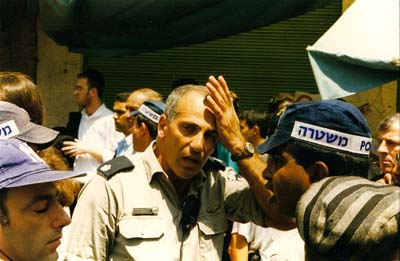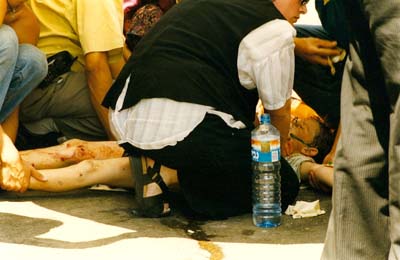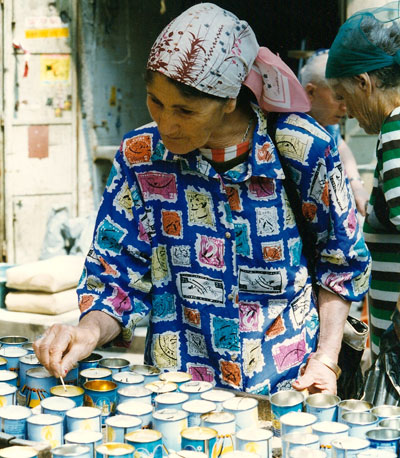 Suicide Bomb attack, Jerusalem. 1997. Photograph by Naomi Gryn
Suicide Bomb attack, Jerusalem. 1997. Photograph by Naomi Gryn
Another Wednesday morning.
I go to Mahane Yehuda, Jerusalem's glorious fruit and vegetable market, just up the road from the house I've rented for the summer. I buy fresh figs, watermelon, ginger, rice, ripe tomatoes, that kind of stuff. I am almost home when I realise that I've forgotten the fish for sushi. Get it later, I think. I hear a couple of blasts. Must be sonic boom. I remember the fish, pick up my purse and keys and I walk back towards the market.
I stumble into someone else's nightmare. People are walking away from the market with tears running down their face. They have seen something terrible. It has left an indelible mark on their face. I have a dreadful feeling of foreboding. I ask a woman on the street what happened. 'P'tsatsa!' she replies. I don't know what she means. I ask another. The same answer. I wonder if there's been a stabbing in the market. Then I see two American women, hysterically reciting to each other what they've just seen. Something about an explosion and a great ball of fire. Trance-like, I venture into the market and in front of me stretches a scene of complete devastation. Everyone seems rooted to the spot. A woman lies on the street, soaked in blood, tended by paramedics. The strangers that surround her try to make her last minutes more bearable. A young boy sits on the sidewalk, crumpled and streaked with blood, his eyes dazed with shock. Soldiers, bomb squads, police, all scurry in panic. Is another bomb about to go off? I want to withdraw, but I also want to grasp what's happened. I start to walk home. Tears are now running down my face too.
 I get back to my house in Nissim Behar and instinctively take down my camera from its hook by the front door. The zoom lens is already attached. There's plenty of fast film loaded. I walk back to the market. The TV boys have arrived. Cameramen run towards the focus of maximum chaos as if their lives depended on it. The road is crowded with police cars, fire engines and ambulances. Sirens scream for attention, but there's no room to pass. Men with long beards and peyot, or sidelocks, wearing the florescent vests of ZAKA's voluntary paramedics, are rushing stretchers up and down the street. The woman lying on the street is still alive, I think, because now she's wearing an oxygen mask. The bloodied young boy is being carried down the street on a stretcher. A teenage girl is carried in the arms of another paramedic. She clings to his neck.
I get back to my house in Nissim Behar and instinctively take down my camera from its hook by the front door. The zoom lens is already attached. There's plenty of fast film loaded. I walk back to the market. The TV boys have arrived. Cameramen run towards the focus of maximum chaos as if their lives depended on it. The road is crowded with police cars, fire engines and ambulances. Sirens scream for attention, but there's no room to pass. Men with long beards and peyot, or sidelocks, wearing the florescent vests of ZAKA's voluntary paramedics, are rushing stretchers up and down the street. The woman lying on the street is still alive, I think, because now she's wearing an oxygen mask. The bloodied young boy is being carried down the street on a stretcher. A teenage girl is carried in the arms of another paramedic. She clings to his neck.
The soldiers look so impotent, so out of control. One has a loudspeaker into which he keeps telling the crowd to disperse, and everyone shuffles a little, craning to see what will happen next. A group of soldiers link arms to try to sweep the crowd further down the street, as if we're an angry mob threatening to riot. But we stay put, stunned by the realisation that we were all the intended victims of this latest terrorist attack. Not the uniformed professionals who've arrived to clean up the mess. We need to grasp the severity of the situation.
Every now and then another panic-stricken friend or relative of one of the injured races through the carnage, trailing horror in their wake. I see the gentle bearded face of Ilan who sells organic figs, honey and pots of herbs. His smile is bittersweet as he packs up his stall. I go into the covered market, to David's fish stand. His phone is ringing. 'Kol b'seder' he says to a well-wisher. All is okay. The phone goes again. 'Kol b'seder, motek. Kol b'seder'. But it's not okay. We don't yet know it, but 16 people are dead or dying, and 178 have been injured by the two blasts. Body parts mixed with exploded watermelon are lying strewn across the market only metres from where we stand. I tell David I'm looking for something for sushi...what's fresh today? He suggests the red snapper and we discuss the possibility of some denis, but I can tell by the look on his face that it's yesterday's catch. Sea bass, he says, triumphantly. It will be fantastic for sushi. Twenty-four shekels and it's mine, filleted and cleaned, with the head and the bones in a plastic bag for Lulu, the cat.
 I come home once more and try to settle down. Outside the sirens are wailing and helicopters are circling in the sky. Telephone goes. A friend calls to see if I'm okay. Everything is all right, I tell her. Her kids are watching cartoons on the telly - I turn on mine so she can hear the news. 'Piguah!' it says on the screen. Attack! I hold the phone near the speaker and Laura translates for me. They think they've identified the bodies of the suicide bombers, the torsos of two young men who lie in pieces alongside their victims. Both carried suitcases, the journalist is saying, waiting until the market reached it's busiest peak. With a single nod they detonated their loads and have now entered the glory of the Kingdom of Allah. Hallelujah. Tonight, will their mothers weep with joy for their martyred sons?
I come home once more and try to settle down. Outside the sirens are wailing and helicopters are circling in the sky. Telephone goes. A friend calls to see if I'm okay. Everything is all right, I tell her. Her kids are watching cartoons on the telly - I turn on mine so she can hear the news. 'Piguah!' it says on the screen. Attack! I hold the phone near the speaker and Laura translates for me. They think they've identified the bodies of the suicide bombers, the torsos of two young men who lie in pieces alongside their victims. Both carried suitcases, the journalist is saying, waiting until the market reached it's busiest peak. With a single nod they detonated their loads and have now entered the glory of the Kingdom of Allah. Hallelujah. Tonight, will their mothers weep with joy for their martyred sons?
Two days have passed. I was in the market today to buy food for Shabbat. There's an unnatural sense of calm. Everyone's discussing where he or she was when the bombs went off and who knows someone whose friend or neighbour or father is dead. Black and white funeral notices are pasted to boards all over the neighbourhood. Hundreds of yarzheit candles have been lit at the ruined stalls of two of the dead. Shoppers stop as they pass, tears rolling down their cheeks. People relight the candles and recite psalms from books handed to them by a couple manning this vigil of grief. Some put money in a jar marked Tzedaka, for charity. It's a bizarre and macabre inversion of the scene at the same stall only a week before. The papers are full of pictures of the victims and the stories of those who narrowly escaped. They all seem to carry different figures for the dead and wounded; most exclude the suicide bombers in their numbers.
The TV news reports from some of the funerals. There's an interview with the sobbing widow of one of the deceased. David Nasco. 43. Two children, aged three and one. Sold grapes in the market, much loved by all. Then there was Simha Fremd, 92. Survivor of Auschwitz, immigrated from South America eighteen years ago. Leib Desyatnik, 60. Physicist and poet. Immigrated just ten months ago from Russia. Mohi Othman, 33. A Muslim from Abu Ghosh, who worked for many years in the market, leaves a wife and three children, aged seven, five and three. Shall I go on?
Ordinary people who were buying and selling food in the market. It could have been you or me. We were just lucky. This time.